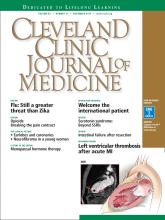Article Figures & Data
Tables
Crohn disease 33.3% Ulcerative colitis 21.1% Radiation enteritis 17.5% Mesenteric ischemia 12.3% Other 15.8% Data from Parekh NR, Steiger E, Seidner DL. Determination of residual bowel length via surgical, radiological or historical data in patients with short bowel syndrome and intestinal failure (abstract). Gastroenterology 2006; 130:a605.
Improve function of the remaining bowel and enhance absorptive capacity Reverse malnutrition and enable patients to attain goal weights and energy levels Reduce or eliminate need for parenteral nutrition Improve quality of life and allow patients to regain what they consider a more normal lifestyle Provide referrals for reconstructive or transplant surgery when needed Diet education Dietary modifications With colon: 50%–60% complex carbohydrates, 20%–30% protein, and 20%–30% fat Without colon: 40%–50% complex carbohydrates, 20–30% protein, and fat as tolerated Soluble fiber Oral rehydration solution Specialized nutrients (eg, vitamins, minerals, modular proteins, medium-chain triglycerides, probiotics) Pharmacologic agents Antidiarrheals Histamine 2 receptor blockers Proton pump inhibitors Somatostatin analogue Alpha 2-adrenergic receptor antagonist Bile acid therapy Pancreatic enzymes Antimicrobials Enteral nutrition Growth factors
Growth hormone
Glucagon-like peptide 2 analoguesSurgical treatments Reconstructive surgery
Reversed-segment procedures
Stricturoplasty
Bowel-lengthening procedures: Bianchi procedure, serial transverse enteroplastyIntestinal transplant
Isolated small-bowel transplant
Combined liver and small-bowel transplant
Multivisceral transplant and modified multivisceral transplantGatorade
2 cups Gatorade + 2 cups water + 1/2 teaspoon saltSugar and salt water
4 cups water + 3/4 teaspoon salt + 2 tablespoons sugar + 1 tablespoon Crystal LightMedication Starting dosagea Maximum daily dose Loperamide Tablets 2 mg four times a day 16 mg Liquid 10 mL four times a day 80 mL Diphenoxylate-atropine Tablets 2.5 mg four times a day 20 mg Liquid 5 mL four times a day 40 mL Codeine Tablets 15 mg four times a day 240 mg Elixir (+ sorbitol) 5 mL four times a day 80 mL Paregoric 5 mL four times a day 150 mL Opium tincture 0.5 mL four times a day 6 mL ↵a 30 minutes before meals and at bedtime.
- TABLE 6
US Centers for Medicare and Medicaid Services indications for intestinal transplant
1. Failure of parenteral nutrition Impending liver failure (total bilirubin 3–6 mg/dL, progressive thrombocytopenia, progressive splenomegaly) or overt liver failure (portal hypertension, hepatosplenomegaly, hepatic fibrosis, cirrhosis) because of liver injury from parenteral nutrition Central venous catheter-related thrombosis of two central veins Frequent central line sepsis: 2 episodes/year of systemic sepsis secondary to line infections requiring hospitalization; a single episode of line-related fungemia; septic shock or acute respiratory distress syndrome Frequent episodes of severe dehydration despite intravenous fluid in addition to parenteral nutrition 2. High risk of death attributable to underlying disease Desmoid tumors associated with familial adenomatous polyposis Congenital mucosal disorders (eg, microvillus atrophy, intestinal epithelial dysplasia) Ultra-short-bowel syndrome (gastrostomy, duodenostomy, residual small bowel ≤ 10 cm in infants and ≤ 20 cm in adults) 3. Intestinal failure with high morbidity or low acceptance of parenteral nutrition Intestinal failure with high morbidity (frequent hospitalization, narcotic dependency) or inability to function (eg, pseudo-obstruction, high-output stoma) Patient’s unwillingness to accept long-term parenteral nutrition (eg, young patients) Adapted from information in reference 50.






